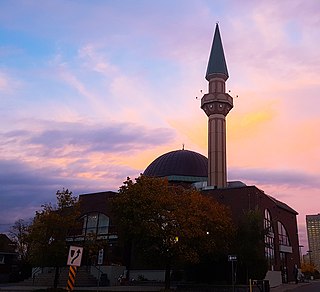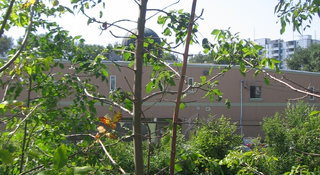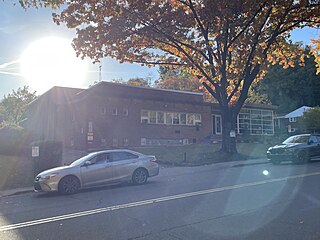
A mosque, also called a masjid, is a place of worship for Muslims. The term usually refers to a covered building, but can be any place where Islamic prayers are performed, such as an outdoor courtyard.

Islam is the second-largest religion in Canada practised by approximately 5% of the population. Canadian Muslims are one of the most ethnically diverse religious groups across the country. Muslims have lived in Canada since 1871 and the first mosque was established in 1938. Most Canadian Muslims are Sunni, while a significant minority are Shia.

Islam is the official religion of the United Arab Emirates. Of the total population, 76.9% are Muslims as of a 2010 estimate by the Pew Research Center. Although no official statistics are available for the breakdown between Sunni and Shia Muslims among noncitizen residents, media estimates suggest less than 20 percent of the noncitizen Muslim population are Shia.
The Muslim Association of Canada is a non-profit organization which provides religious and educational services for the Muslim community in Canada.

Barbados is an overwhelmingly Christian majority country, with Islam being a minority religion. Due to secular nature of the country's constitution, Muslims are free to proselytize and build places of worship in the country. Statistics for Islam in Barbados estimate a Muslim population of over 4000, most of whom are immigrants or descendants of immigrants from the Indian state of Gujarat. A few immigrants from Guyana, Trinidad, South Asia, and the Middle East, as well as about 200 native-born persons, constitute the rest of the growing Muslim community, representing 1.50 percent of the population Close to 90 percent of all Barbadians are of African descent (Afro-Bajans), mostly descendants of the slave labourers on the sugar plantations. The remainder of the population includes groups of Europeans (Euro-Bajans), Asians, Bajan Hindus and Muslims, and an influential Middle Eastern (Arab-Bajans) group mainly of Syrian and Lebanese descent.
The En-Naeem Mosque is a mosque located at the junction of Hougang Avenue 3 and Tampines Road, in Hougang, Singapore. It is built under the Mosque Building Fund (MBF) by MUIS Mosque Management.

The Islamic Institute of Toronto (IIT) is a non-profit Islamic educational institute in Toronto, Canada.

The Salaheddin Islamic Centre is a mosque located in the Scarborough district of the city of Toronto, Ontario, Canada, noted for its outspoken Imam Aly Hindy and alleged links to convicted terrorists.

Jami Mosque is a mosque in Toronto, Ontario, Canada. Located just east of High Park, it is the oldest Canadian Islamic centre in the city and dubbed "the mother of all the mosques in Toronto".

The Islamic Centre of England Ltd (ICEL) is a religious and cultural institution linked to the Iranian government at 140 Maida Vale, London, whose mission is "to provide services to members of the Muslim community, in particular, and the wider community at large", focusing on religious guidance and cultural issues. It was founded in December 1995 and opened officially in November 1998. The premises are a former cinema that is a listed building.

Abdullah Nooruddeen Durkee was a Muslim scholar, thinker, author, translator, and the Khalifah (successor) for North America of the Shadhdhuli School for Tranquility of Being and the Illumination of Hearts, Green Mountain Branch. Nooruddeen Durkee became a Muslim in his early thirties in Al-Quds, Jerusalem. He was one of the co-founders of Lama Foundation and founder of Dar al-Islam Foundation.

The Fukuoka Masjid Al Nour Islamic Culture Center (アン ヌール イスラム文化センター 福岡マスジド) is the first mosque on the island of Kyūshū in Japan. It is located in Hakozaki, Higashi-ku in the city of Fukuoka. It was built in 2009, and officially opened on 12 April 2009. Fukuoka Mosque aims to serve about 1,000 Muslims in Fukuoka Prefecture, as well to serve people in Japan interested in Islam.

Shabir Ally is a Canadian Islamic scholar. As of 2020, he was President of the Islamic Information & Dawah Centre International in Toronto. He promotes a contextual interpretation of Qur'anic verse, and justification of them in similar expressions within the Christian Bible. Ally performs dawah by adopting preaching methods targeted at both the Muslim population and the non-Muslim population.
Islam is the majority and official religion in the United Arab Emirates, professed by 74.5% of the population as of 2020. 63.3% are Sunni, 6.7% are Shia, while 4.4% follow another branch of Islam. The Al Nahyan and Al Maktoum ruling families adhere to the Maliki school of jurisprudence. Many followers of the Hanbali school are found in Sharjah, Umm al-Quwain, Ras al-Khaimah and Ajman. Their followers include the Al Qasimi ruling family. The other main religions present in the country include Christianity (12.9%), Hinduism (6.2%), and Buddhism (3.2%). Zoroastrians, Druze, Baha'i, Judaism, and Sikhism are also practiced by some non-nationals. 1.3% of the population is agnostic.

Qatar is an Islamic state with multi-religious minorities like most of the Persian Gulf countries with waves of migration over the last 30 years. The official state religion is Sunni Islam. The community is made up of Sunni and Shi’a Muslims, Christians, Hindus, and small groups of Buddhists and Baha’is. Muslims form 65.5% of the Qatari population, followed by Christians at 15.4%, Hindus at 14.2%, Buddhists at 3.3% and the rest 1.9% of the population follow other religions or are unaffiliated. Qatar is also home to numerous other religions mostly from the Middle East and Asia.

Khalifa Ezzat was born in upper Egypt where he first received his Islamic education in the Al Azhar Institute. Khalifa completed the memorisation of the Qur'an, at early age. As part of, his prep and secondary school at Al-Azhar in Al Fashn; his early academic life, predominately composed of learning major traditional Islamic doctrines, including, Tafsir, Hadith, Arabic language, Shariah/Fiqh, and Theology. After successfully completing his secondary education, he was nominated and enrolled in Al Azhar University in Cairo to complete his Islamic education.

The Islamic Cultural Centre of Quebec City is an organization dedicated to meeting the spiritual, social and economic needs of the Muslim community residing in Quebec City, Quebec, Canada. Its main place of worship is the Great Mosque of Quebec City.

The Islamic Center of Pittsburgh is an Islamic educational, social services, and community outreach organization in the Oakland neighborhood of Pittsburgh, Pennsylvania. Founded in 1989, it is the largest mosque in the city, attracting 600 to 700 participants for weekly prayers. It provides social services for people of all religious backgrounds and engages in educational outreach and interfaith dialogue to foster community understanding and cooperation.

The Midnight Sun Mosque, also known as the Inuvik Mosque or Little Mosque on the Tundra, is a non-denominational Islamic house of worship located in Inuvik, Northwest Territories, Canada. The mosque was built in 2010 for the town's small Muslim community. It is the northernmost mosque in the Western Hemisphere and the only one in North America above the Arctic Circle.
















